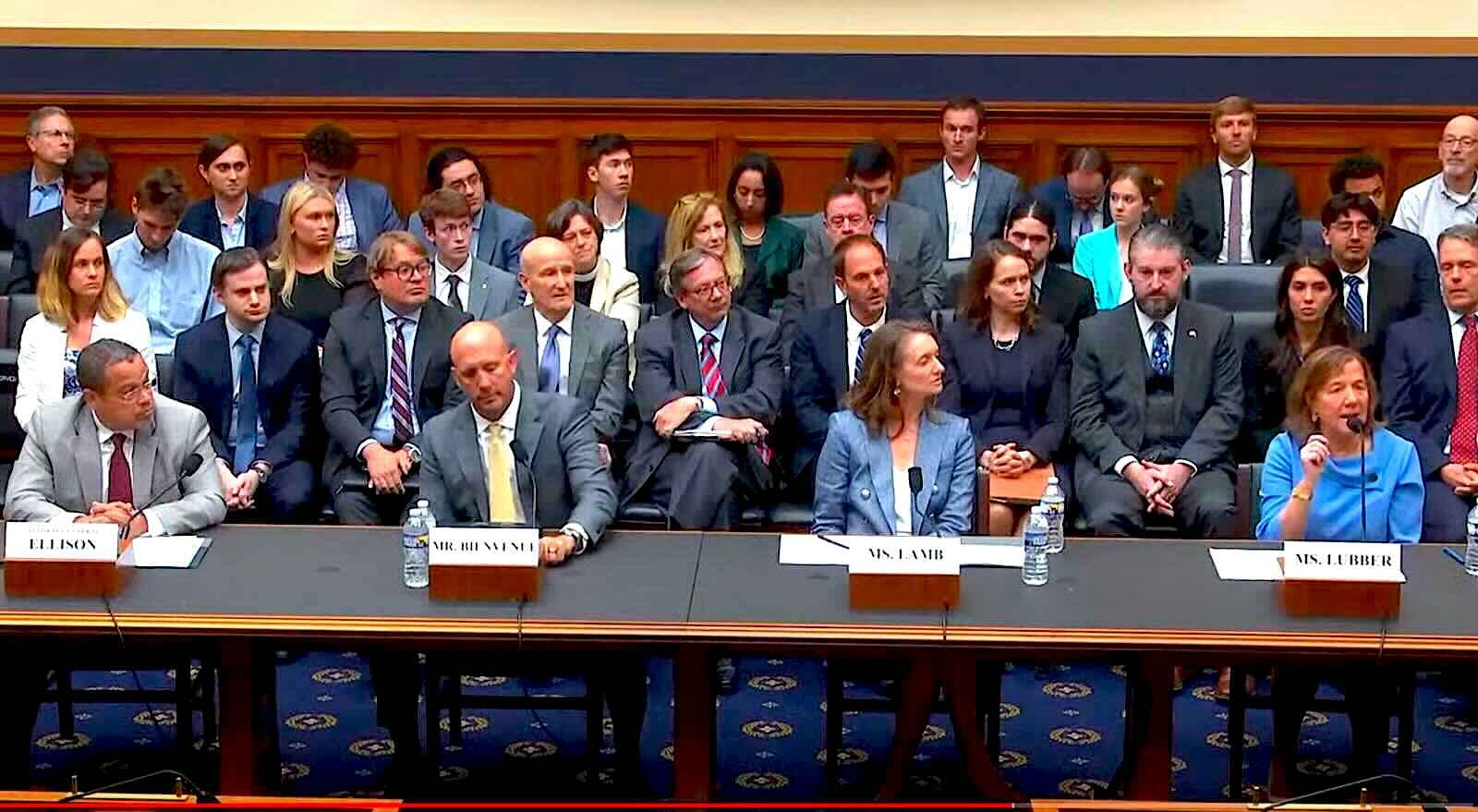Greetings Agents of Impact!
In today’s Brief:
- Political risk in attacks on ESG, climate and diversity
- Outcomes-based Indigenous capital
- LeapFrog’s climate dealmaking in India
Featured: Policy Corner
Political risk: Antitrust hearing on ‘climate cartel’ escalates Republican attacks on ESG. Call them the Climate Action 14. At today’s hearing before the antitrust subcommittee of the US House Judiciary Committee, the Republican majority will present evidence of what it calls a “climate cartel” of more than a dozen major financial institutions, along with their advisors and nonprofit allies. Their alleged antitrust violations: collusion to force American companies to decarbonize and reach net zero, according to the committee’s majority report released Tuesday. In the hot seat at the 10:30am ET hearing on “decarbonization collusion” are Dan Bienvenue of the California Public Employees’ Retirement System, the nation’s largest pension fund with $483 billion in assets, along with Natasha Lamb of Boston-based Arjuna Capital, and Mindy Lubber of the climate action nonprofit Ceres. Ceres helped CalPERS organize Climate Action 100+, the investor coalition that engages high-emitting corporations on their climate plans and which is the primary target of the committee’s investigation.
- Attack on DEI. The antitrust investigation is part of a broader, coordinated campaign by some Republicans to snuff out efforts to redress racial inequities and integrate environmental, social and governance concerns into investment decision-making. Activists on the right have sued the nonprofit arm of Atlanta-based Fearless Fund over a program that funds Black female entrepreneurs. In April, the same group, led by conservative activist Edward Blum, filed suit in Texas against the nonprofit arm of Founders First, a San Diego-based business lender. Suits against Liftfund Inc., a nonprofit community development financial institution, and Houston-based Hello Alice, which provides grants to Black entrepreneurs, have been dismissed. The lawsuits “seek to sow confusion and disrupt the ability of investors to make decisions that are consistent with their fiduciary duty,” says Fran Seegull of the US Impact Investing Alliance, which is tracking the legal challenges (disclosure: the Alliance supports ImpactAlpha’s Policy Corner).
- Climate Action 14. Fourteen organizations have been flooded with threatening letters and subpoenas and called in for interviews over the past 18 months. They include Trillium Asset Management, BlackRock, State Street, Vanguard, proxy advisors Glass Lewis and ISS, the nonprofit shareholder representative As You Sow, the Net Zero Asset Managers initiative, and the Glasgow Financial Alliance for Net Zero (for background see, “Dear Alleged Co-Colluders: Let’s really make common cause for climate action,” by As You Sow’s Andy Behar). Legal analyses by Jenner & Block, Wilson Sonsini and others have concluded there is little legal basis for the committee’s antitrust claims. Such investor collaboration “advances public welfare,” Colorado attorney general Phil Weiser argues. “If you give in to intimidation that’s not based on a true legal analysis, then you’re inviting more of this activity.”
- Lower costs. Decarbonization, the committee charges, reduces output and raises prices. Yet effective action on climate change is more likely to lower costs to consumers and society than it is to raise them. Extreme weather has driven up the price of everything from chocolate to oranges and has cost society more than $16 million per hour. The International Energy Agency says solar power is the cheapest source of electricity ever. “Climate change is an issue that presents both serious financial risks and opportunities for investments and job creation in the rapidly emerging clean energy economy,” said Ceres’ Lubber in her prepared testimony. Each Climate 100+ member “acts separately and in the best interests of their shareholders, beneficiaries, and clients.”
- Keep reading, “Political risk: Antitrust hearing escalates Republican attacks on climate action,” by Amy Cortese and David Bank on ImpactAlpha.
Sponsored by BlueMark
Making the mark. BlueMark’s fifth installment of “Making the Mark” provides clarity and insights into the “how” of impact investing in order to drive transparency and accountability in the market. This year’s report spotlights leading investors and impact investing practices, with visuals and in-depth data analysis. As the number of BlueMark verified investors grows, so does the firm’s data, enriching its benchmarks and understanding of the state of impact investing. Dive into insights from 110+ verifications of impact investors that are managing more than $233 billion in impact assets. Read the report.
Dealflow: Returns on Inclusion
Raven Indigenous Capital lands backing for its outcomes-based finance fund. Vancouver-based Raven Indigenous Capital Partners launched in 2018 to steer capital to Indigenous businesses and communities in Canada and the US. The firm is looking to raise C$50 million (US$37.5 million) for an outcomes-based finance fund that designs financial instruments with communities for health and climate-related initiatives. Christensen Fund, a San Francisco-based nonprofit focused on Indigenous communities, made a $2 million, seven-year program-related investment.
- Trust-based finance. “Moving at the pace of trust” is crucial for funders directing capital to Indigenous communities (see, “Mobilizing capital in Indian Country”). Raven’s approach brings together community leaders and members to create “community-driven outcomes contracts,” or CDOCs. “The convening employs community learning to build trust-based relationships inclusive of Indigenous protocols and ceremony,” Christensen explained in a post.
- Pilot projects. Before launching the fund, Raven piloted CDOCs for energy access, housing upgrades and diabetes management projects, including a $5.1 million, two-year deal to install geothermal energy and retrofit housing for the Fisher River Cree Nation and Peguis First Nation. Boann Social Impact, which has a C$135 million investment mandate from the Canadian government’s Social Finance Fund, has also backed the Outcomes fund. Raven last year closed a C$100 million fund to invest in Indigenous-led startups.
- Dive in.
LeapFrog backs Battery Smart to swap batteries for two- and three-wheelers in India. India-based Battery Smart has built a network of more than 1,000 battery swapping stations to accelerate the country’s transition to electric vehicles. The company serves drivers of electric motorbikes and rickshaws, which make up the majority of vehicles on India’s roadways (see, “Small vehicles have investors thinking big about India’s e-mobility transition“). LeapFrog Investments led the company’s $65 million Series B round. It’s the first deal in LeapFrog’s $500 million climate strategy, launched last year. Other investors in the round include Panasonic, Ecosystem Integrity Fund, Japan’s MUFG Bank, Blume Ventures and British International Investment.
- E-mobility. Small vehicles account for 30% of India’s transport-related carbon emissions and are a big driver of its urban air pollution. “Indians’ greatest anxiety in switching to EVs remains the lack of charging infrastructure, followed by other concerns like upfront cost, safety, and driving range,” LeapFrog’s Nakul Zaveri told ImpactAlpha. An estimated half of India’s new motorbikes and one-third of rickshaws will be electric by 2030. Battery Smart says it has completed 35 million EV battery swaps for 45,000 vehicles. It is partnering delivery service Zepto to support its goal of getting 10,000 electric delivery vehicles on the road.
- EV excitement. Battery Smart’s financing will help make battery swapping “an essential e-mobility service for riders who demand convenience, higher range and greater earning potential, without the high costs,” Zaveri said. Electric vehicles, and the battery tech and infrastructure supporting them, are a key sector for climate tech investors in India. British International Investment recently backed two other EV startups in India: manufacturer Euler Motors and EV financing firm Turno.
- Check it out.
Washington State Investment Board eyes $400 million allocation to TPG Rise Climate Fund II. TPG Rise Fund, the $19 billion impact investing arm of private equity giant TPG, is in fundraising mode again. In a pitch to Washington’s $197 billion public pension fund, TPG’s Jim Coulter touted clean energy for AI and electrification, reported The Middle Market. The Washington State Investment Board’s investment committee recommended a $400 million allocation to TPG’s second Rise Climate Fund, which is looking to raise up to $10 billion. “It’s a new era in the market,” Coulter told the committee. Large US pension funds and other long-term investors are setting their sights on climate opportunities in private markets (see, “Institutional investors seek bigger stakes in climate assets in private markets”).
- Institutional impact. TPG has been collecting billion-dollar commitments for its fund since late last year. Saudi Arabia’s Hassana Investment Company is part of a $1.5 billion partnership with TPG. At last year’s COP28 climate summit, TPG secured $1 billion from Alterra, the United Arab Emirates’ $30 billion climate fund. More than two dozen major corporations, including Apple and Google, have committed a combined $1 billion. Large and sophisticated investors, says Coulter, are essential to meeting the growing capital needs of the new climate economy.
- Climate track record. TPG’s first climate fund closed at $7.3 billion in 2022 and has deployed $4.7 billion. The fund’s four exits so far total $709 million; another $200 million is expected from a soon-to-close deal. Last month, TPG Rise Climate acquired California-based Olympus Terminals, which transports and stores renewable fuel. TPG is expanding its portfolio of energy transition, green mobility, sustainable fuels, sustainable products and materials, and low-carbon solutions investments.
- Share this post.
Dealflow overflow. Other investment news crossing our desks:
- France’s Kelvin raised €4.7 million ($5.1 million) in equity as well as non-dilutive financing for its AI-powered home energy auditing software. (TechCrunch)
- Blue Earth Capital provided $16 million in credit to Samunnati to extend financing and advisory services to smallholder farmers in India. Samunnati works with nearly 10,000 farmer collectives and agri-enterprises in 28 Indian states. (Blue Earth Capital)
- Indonesia’s eFishery secured $30 million in debt from HSBC Indonesia to sell its automatic feeders to smallholder fish and shrimp farmers. (HSBC Indonesia)
- Chile’s FarmaLoop raised $900,000 to curb pharmaceutical waste and help chronic disease patients reduce their drug spending costs. The firm delivers medications to patients and offers lower prices on soon-to-expire drugs. (Contexto)
Agents of Impact: Follow the Talent
LISC is on the hunt for a president to oversee its Greenhouse Gas Reduction Fund award… Citi is looking for a sustainability and ESG analyst in New York… Matrix Renewables seeks an investment associate in Miami… Private Infrastructure Development Group is looking for an impact advisor in Singapore… The Good Food Institute is recruiting an impact vice president to work remotely.
UCLA Anderson School of Management’s Center for Impact seeks an adjunct lecturer to teach MBA classes on social impact and sustainability… FINCA Ventures is hiring a managing director in Nairobi… Latimpacto will host its Impact Minds annual conference Sept. 9-12 in Oaxaca, Mexico… Mission Investors Exchange is hosting a webinar on the potential of AI in impact investing communications, marketing and content creation, Thursday, June 27.
👉 View (or post) impact investing jobs on ImpactAlpha’s Career Hub.
Thank you for your impact!
– June 12, 2024











